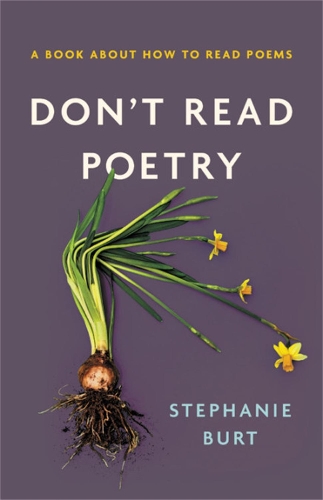
Don't Read Poetry: A Book About How to Read Poems
(Hardback)
Available Formats
Publishing Details
Don't Read Poetry: A Book About How to Read Poems
By (Author) Stephanie Burt
Basic Books
Basic Books
23rd July 2019
United States
Classifications
General
Non Fiction
809.1
Physical Properties
Hardback
320
Width 140mm, Height 214mm, Spine 36mm
438g
Description
In Don't Read Poetry, award winning poet and literary critic Stephanie Burt offers an accessible introduction to the seemingly daunting task of reading, understanding, and appreciating poetry. She dispels preconceptions about poetry, explains how poems speak to one another, and how they can speak to our lives. It shows readers how to find more poems once they have some poems they like, and how to connect the poetry of the past to poetry of the present.
Unlike other guides, Burt does not approach poetry chronologically, or by school, form, or poet. Instead, her book moves through six reasons to read poetry. These include "feeling and attitude," or how poems can embody, reflect, and share emotions, and "difficulty and frustration," or how poets present us with problems and let us see the world anew. Each chapter explores the theme through the works of various poets and their histories. Burt moves seamlessly from the "classics" - Sappho, Wordsworth, Plath &c - to poetry circulated in Riot Grrrl fanzines or on Twitter. She challenges the assumptions that most people make about "poetry," whether they think they like it or think they don't (it's all old; it's all incomprehensible; it's sappy, or soppy; it's lovely; it's uplifting; it's good if it's in the New Yorker; it can't be good if it's in the New Yorker) in order to help us cherish-and distinguish among-individual poems. If the book has one governing argument, it's this: Don't read "poetry"; read poems.Burt seeks to fill a gap by providing a book that, while suitable for course adoption, is written for the average trade reader. Don't Read Poetry stands apart from other books as well in the sheer range of forms considered (from aubades to zeugma-based, Twitter-friendly epigrams), and the timeline covered. For the first time, Burt will take full account of new styles of poetry from the past few decades-poetry dependent on the digital environment, for example, or on practices imported from gallery art, from radical social thought (CAConrad, or books from Ugly Duckling Presse), or the culture and language of Korean, and Native, and Chinese, and Latina/o/x, Americans, from Carter Revard to the current U.S Poet Laureate.Destined to become a classic, Don't Read Poetry is the perfect book for anyone confronting poetry for the first time, but also has much to teach the those fully immersed in the genre.Reviews
Don't Read Poetry is for readers hunting sharp, nimble thinking about culture, comprehension, and poems. Whether discussing an ancestral Hawaiian language, a canonical poet like Langston Hughes, or contemporary poets like Rodrigo Toscano and Jennifer Chang, Stephanie Burt manages to illuminate 'the difficult process of turning paired marks into words.' Don't read poetry, she suggests, read poems. This is a book for anyone who reads with curiosity, care and imagination.--Terrance Hayes, author of American Sonnets for My Past and Future Assassin
[An] inviting guide to an art form often seen as abstruse... At once erudite and colloquial, the book resists prescriptive judgments, teems with surprising juxtapositions, and evokes the contagious enthusiasm of a cool teacher.--New Yorker
[T]here are some empowering concepts and more than a few compelling arguments should you decide to approach Don't Read Poetry . . . with an open mind, a gracious ear, and a loving heart.--New York Journal of Books
Burt is well-suited to convince even the most skeptical readers that poems, indeed, should be read by everybody.--Booklist (starred review)
Charming...Burt is a delightful companion who reminds us that poems go down a lot better if we read them out loud and slowly...The whole idea of Don't Read Poetry is not only to celebrate the freedom and inventiveness in poems...but also to connect poems to a larger world of beauty.--The Christian Science Monitor
For the past fifty years, poetry critics have battled over what poetry is, which poets mattered, and which didn't. Stephanie Burt says they had it wrong. Don't read poetry, this dedicated pluralist tells us, if by poetry you mean one thing. If however you want to read poems, and discover the manifold ways they can be -- and help readers to be -- good (for Burt's aesthetic vision is ultimately ethical), read this lucid, informed, and deeply humane book.--Langdon Hammer, author of James Merrill: Life and Art
In this eloquent literary primer, Burt...contends with poetry's reputation for inaccessibility...[A] sweeping, insightful survey.--Publisher's Weekly
When I began Stephanie Burt's Don't Read Poetry, I fully expected her to widen and deepen my appreciation of this art form. Burt is, after all, a masterful poet, teacher, and literary critic. What I didn't necessarily expect was that I'd have such a great time absorbing what she has to say. Whether you love poetry or resist it, you will enjoy this entertaining and enlightening book.--Wally Lamb
Author Bio
Stephanie Burt is a professor of English at Harvard University, coeditor of poetry at the Nation, and the recipient of a 2016 Guggenheim fellowship for poetry. Her work appears regularly in the New York Times Book Review, New Yorker, London Review of Books, and other journals. She lives in Massachusetts.
